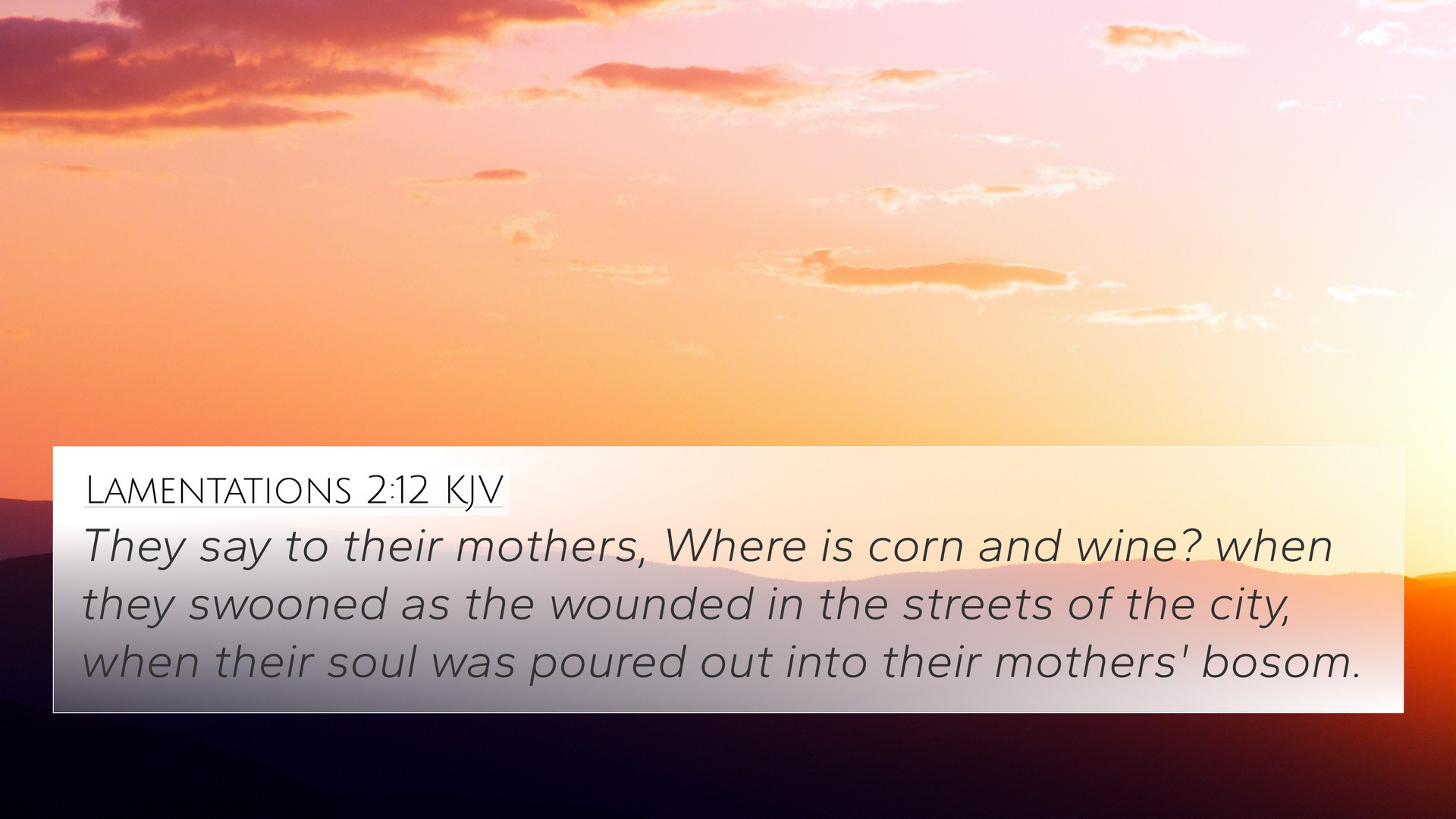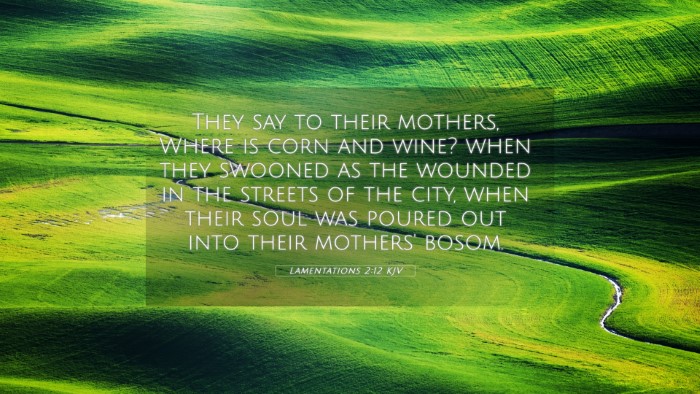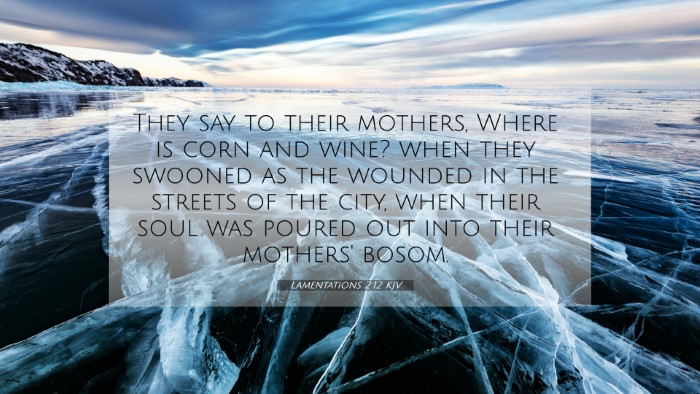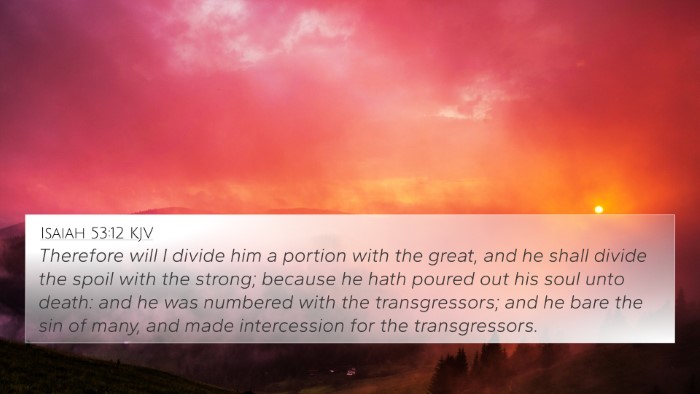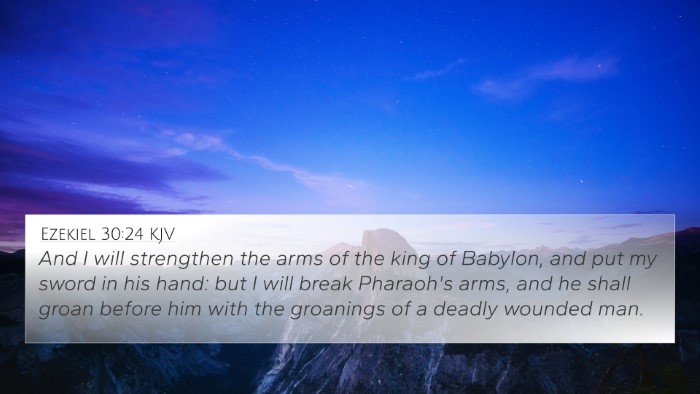Lamentations 2:12 - Understanding the Verse
Lamentations 2:12 states: "They say to their mothers, Where is corn and wine? when they swayed as the wounded in the streets of the city, when their soul was poured out into their mothers' bosom." This verse captures a poignant moment of suffering and despair, reflecting the deep anguish experienced during the aftermath of Jerusalem’s destruction.
Verse Meaning and Context
The book of Lamentations, traditionally attributed to the prophet Jeremiah, expresses profound sorrow over the devastation of Jerusalem. In verse 12, we witness children emotionally overwhelmed, inquiring about sustenance, depicting their distress in witnessing their city and their lives crumble.
Here are some insights from notable public domain commentaries regarding Lamentations 2:12:
-
Matthew Henry:
Henry emphasizes the devastating impact of the city's ruin on the innocent. He points out how children, who rely on their mothers for nourishment and care, are left in a state of despair as they search for food in the midst of utter destruction.
-
Albert Barnes:
Barnes highlights the contrast between the child's dependency and the harsh reality of famine. He interprets this question as an expression of lost hope, showcasing the dire circumstances where fearful children cannot find basic provisions.
-
Adam Clarke:
Clarke takes the emotional aspect further, illustrating the mental anguish of both children and mothers. He argues that the verse poignantly reflects the bond of family disrupted by calamity, indicating the physical and emotional desolation that comes from wartime strife.
Key Themes and Messages
The verse illustrates several themes central to the understanding of human suffering in the biblical context:
- Despair and Suffering: A clear reflection of the emotional and physical hardships faced by the people.
- The Role of Family: The depiction of mothers and children highlights the pain within the family unit amidst crises.
- Loss of Sustenance: Represents not just physical hunger but a deeper spiritual longing that accompanies destruction.
Bible Verse Cross-References
In understanding Lamentations 2:12, we can draw connections to several other Bible verses that echo similar themes:
- Psalm 102:4: "My heart is smitten, and withered like grass; so that I forget to eat my bread." - Reflects deep mourning and despair.
- Isaiah 24:11: "There is a cry for wine in the streets; all joy is darkened, the mirth of the land is gone." - Parallels the despair of lacking basic needs.
- Jeremiah 14:3: "And their nobles have sent their little ones to the waters: they came to the pits, and found no water; they returned with their vessels empty; they were ashamed and confounded, and covered their heads." - Illustrates similar themes of hunger and shame.
- Matthew 15:32: "Then Jesus called his disciples unto him, and said, I have compassion on the multitude, because they continue with me now three days, and have nothing to eat..." - Jesus’ empathy mirrors the situation presented in Lamentations.
- Mark 8:2: "I have compassion on the multitude, because they have now been with me three days, and have nothing to eat." - Emphasizes the plight of those who suffer from lack.
- Lamentations 1:11: "All her people sigh, they seek bread; they have given their pleasant things for meat to relieve the soul: see, O Lord, and consider; for I am become vile." - Highlights the desperation for sustenance similar to Lamentations 2:12.
- 2 Corinthians 1:5: "For as the sufferings of Christ abound in us, so our consolation also abounds through Christ." - Reflects the hope amidst suffering.
Thematic Connections Between Bible Verses
This verse can be linked with various themes throughout scriptures:
- Hope in Despair: Many verses, including Lamentations 3:22-23, highlight the themes of hope in divine mercy despite despair.
- The Importance of Community: Acts 2:44-45 reflects the early church's sharing of resources, countering the isolation felt in Lamentations.
- Sustenance and Spiritual Nourishment: John 6:35, where Jesus states, "I am the bread of life," provides a deeper spiritual context to physical needs.
Tools for Biblical Cross-Referencing
To further enhance your exploration of Bible verse connections, consider these resources:
- Utilize a Bible Concordance to find cross-references between similar themes.
- Engage in Cross-reference Bible study to draw parallels between verses.
- Employ a Bible cross-reference guide for structured study methodology.
Conclusion
In conclusion, Lamentations 2:12 serves as a powerful reminder of the emotional depth of human suffering and the quest for hope amidst catastrophe. By engaging in a thorough study through comparative Bible verse analysis and cross-referencing Biblical texts, one can uncover not just the pain reflected in this verse, but also the wider theological themes of suffering, family bonds, and spiritual reality that it encapsulates.
